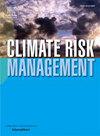The role of entrepreneurial orientation on farmer’s adoption of crop diversification under climate change: Evidence from rural Pakistan
IF 5
2区 环境科学与生态学
Q1 ENVIRONMENTAL SCIENCES
引用次数: 0
Abstract
Climatic shocks cause severe risks and uncertainties to agricultural production in developing countries. Crop diversification is an important strategy to improve farmers’ livelihoods and agricultural productivity during climate change. Existing studies have explored many factors influencing farmers’ decisions to adopt crop diversification practices. However, the role of entrepreneurship orientation (EO) in farmer’s adoption of crop diversification has not received enough attention. This study specifies EO in three dimensions (risk-taking, innovativeness, proactiveness) and first, it examines the impact of EO on farmers’ adoption of crop diversification practices, using the instrumental variable-Probit (IV-Probit) model based on the data collected from farmers in Punjab, Pakistan. The results reveal that EO significantly increases farmers’ adoption of crop diversification practices. Specifically, risk-taking and innovativeness promote farmers’ crop diversification, but proactiveness has a negative impact. We also find that market orientation mediates between EO and farmer’s crop diversification. EO enhances farmers’ market orientation which imposes a positive impact on the adoption of crop diversification. The findings underscore the importance of EO in farmers’ adaptation to climate change in agricultural production. Policymakers can better design training programs to improve farmer’s knowledge and skills from the EO perspectives.
气候变化下企业家导向对农民采用作物多样化的作用:来自巴基斯坦农村的证据
气候冲击给发展中国家的农业生产带来了严重的风险和不确定性。作物多样化是在气候变化期间改善农民生计和农业生产力的重要战略。现有的研究已经探索了影响农民采取作物多样化做法决策的许多因素。然而,创业导向在农民采用作物多样化中的作用尚未得到足够的重视。本研究从三个维度(冒险性、创新性、主动性)来界定创业意识。首先,基于从巴基斯坦旁遮普省农民收集的数据,使用工具变量probit (IV-Probit)模型,研究了创业意识对农民采用作物多样化做法的影响。结果表明,生态效益显著提高了农民对作物多样化做法的采用。具体而言,冒险性和创新性对农民作物多样化有促进作用,而主动性对农民作物多样化有负面影响。我们还发现,市场导向在经济效益与农民作物多样化之间起中介作用。经济效益提高了农民的市场导向,对作物多样化的采用产生了积极的影响。研究结果强调了生态环境对农民适应农业生产中气候变化的重要性。政策制定者可以更好地设计培训项目,以提高农民的知识和技能。
本文章由计算机程序翻译,如有差异,请以英文原文为准。
求助全文
约1分钟内获得全文
求助全文
来源期刊

Climate Risk Management
Earth and Planetary Sciences-Atmospheric Science
CiteScore
8.20
自引率
4.50%
发文量
76
审稿时长
30 weeks
期刊介绍:
Climate Risk Management publishes original scientific contributions, state-of-the-art reviews and reports of practical experience on the use of knowledge and information regarding the consequences of climate variability and climate change in decision and policy making on climate change responses from the near- to long-term.
The concept of climate risk management refers to activities and methods that are used by individuals, organizations, and institutions to facilitate climate-resilient decision-making. Its objective is to promote sustainable development by maximizing the beneficial impacts of climate change responses and minimizing negative impacts across the full spectrum of geographies and sectors that are potentially affected by the changing climate.
 求助内容:
求助内容: 应助结果提醒方式:
应助结果提醒方式:


